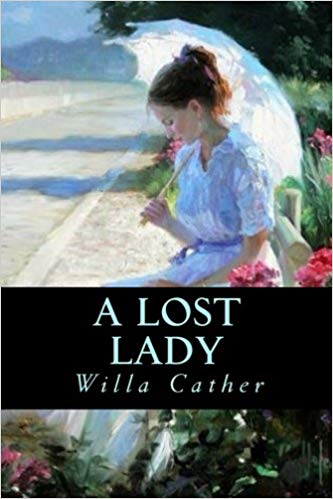
I reread A Lost Lady this week. Inhaled it really. The characters are so vivid, as is the portrait of the farm towns of the prairies at the turn of the century. The great rail roads were built, and the settlers had come, but soon the chiselers and cheapskates would take the place of the larger than life figures who had created the original settlements. One of the characters is the Forrester homestead itself:
“Just at the foot of the hill on which the house sat, one crossed a second creek by the stout wooden road-bridge. This stream traced artless loops and curves through the broad meadows that were half pasture land, half marsh.”
“Any one but Captain Forrester would have drained the bottom land and made it into highly productive fields. But he had selected this place long ago because it looked beautiful to him, and he happened to like the way the creek wound through his pasture, with mint and joint-grass and twinkling willows along its bank. He was well off for those times, and he had no children. He could afford to humor his fancies.”
Mrs. Forrester, the lost lady of the title, is a winsome, engaging woman, the essence of grace and good taste. The story is told through the eyes of a young boy who looks up to her, finds in her the emblem of all that is elegant and delightful, and who grows up under her spell. He is present as Forrester loses his fortune by personally bankrolling a failed bank, the only one of the directors to come forward and save the depositors.
Later, he must rent the pasture land to an unscrupulous character, Ivy Peters: “Neil and Ivy had disliked each other from childhood, blindly, instinctively, recognizing each other through antipathy, as hostile insects do. By draining the marsh Ivy had obliterated a few acres of something he hated, though he could not name it, and had asserted his power over the people who had loved those unproductive meadows for their idleness and silvery beauty…
“The Old West had been settled by dreamers, great-hearted adventurers who were unpractical to the point of magnificence… Now all the vast territory they had won was to be at the mercy of men like Ivy Peters, who had never dared anything, never risk anything. They would drink up the mirage, dispel the morning freshness, root out the great brooding spirit of freedom, the generous, easy life of the great land-holders. The space, the colour, the princely carelessness of the pioneer they would destroy and cut up into profitable mats, as the match factory splinters the primeval forest.”
The lost lady of the title is not just Mrs. Forrester, but the west itself, described beautifully. Of course, the native population might feel the same about the”great-hearted adventurers,” but that’s a different book. This one is a gem of a portrait of a lost time.